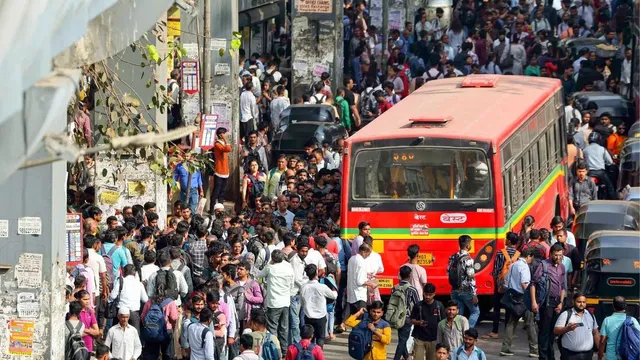- By Shibra Arshad
- Thu, 15 May 2025 03:40 PM (IST)
- Source:JND
The daily ridership of Brihanmumbai Electricity Supply and Transport (BEST) registered a drop of at least 10 per cent in its traffic after the recent fare hike, Times of India reported. The footfall on some stations has also reduced significantly following the fare hike on May 9. Quoting the sources, the report added that it is anticipated that more people can ditch the BEST as other options like shared autos offer fares at relatively the same price as those of BEST.
Although, BEST officials reiterated that the drop in ridership is "mainly due to the summer vacation, a period when citizens are on leave," experts from Mumbai Mobility Forum and citizens' group Aamchi Mumbai Aamchi BEST (AMAB) said the fact that communters of BEST have migrated to shared autos and share taxis cannot be ruled out.
The minimum fare of the bus after the hike is Rs 10 for non-AC and Rs 12 for AC. In contrast, the shared auto only charges Rs 10, which is found to be a better option instead of waiting for the bus for 40 minutes, a Mulund resident was quoted as saying in the report. The resident Bharat Soni further said, Several commuters, frustrated after waiting for buses for 40 minutes, do not mind switching to share autos at the same price from the railway station to Swapna Nagri in Mulund Hills."
ALSO READ: UP Road Accident: 6 Killed After Head-On Collision Between Auto And Truck In Hardoi; Probe Underway
Hillside Residents Welfare Association, in an X post, expressed concern over the fare hike and said that the marginalised section of society is highly affected by the rise. The X post read, "The majority of commuters affected due to fare hike are maids, security guards, workers, senior citizens, and middle-class office goers. Today, they also do not mind paying Rs 3 extra (Rs 15) for a share auto fare instead of waiting for 20 minutes for a bus."
A senior member of AMAB said that BEST buses offered the commute service at the lowest price among the available commute mediums, which was Rs 5 for non-AC and Rs 6 for AC for a travel distance of 5 km, now the fare hike will not only shift the commuters to other options it will also increase the traffic congestion.
"The previous experiences with fare hikes have shown that commuters shift to alternative modes of transport like share autos and taxis. This shift creates additional traffic congestion and increases pollution levels in the city. A section of commuters were also in favour of hikes," the official was further quoted.
Transport analyst Hussain Indorewala was sourced as saying in the report, "Public transport in Mumbai needs proper govt funding and support to maintain its essential service. The current trend of privatisation has resulted in poor maintenance, inadequate staff training, and reduced route coverage. These issues directly affect the working-class population who depend on affordable public transport."

